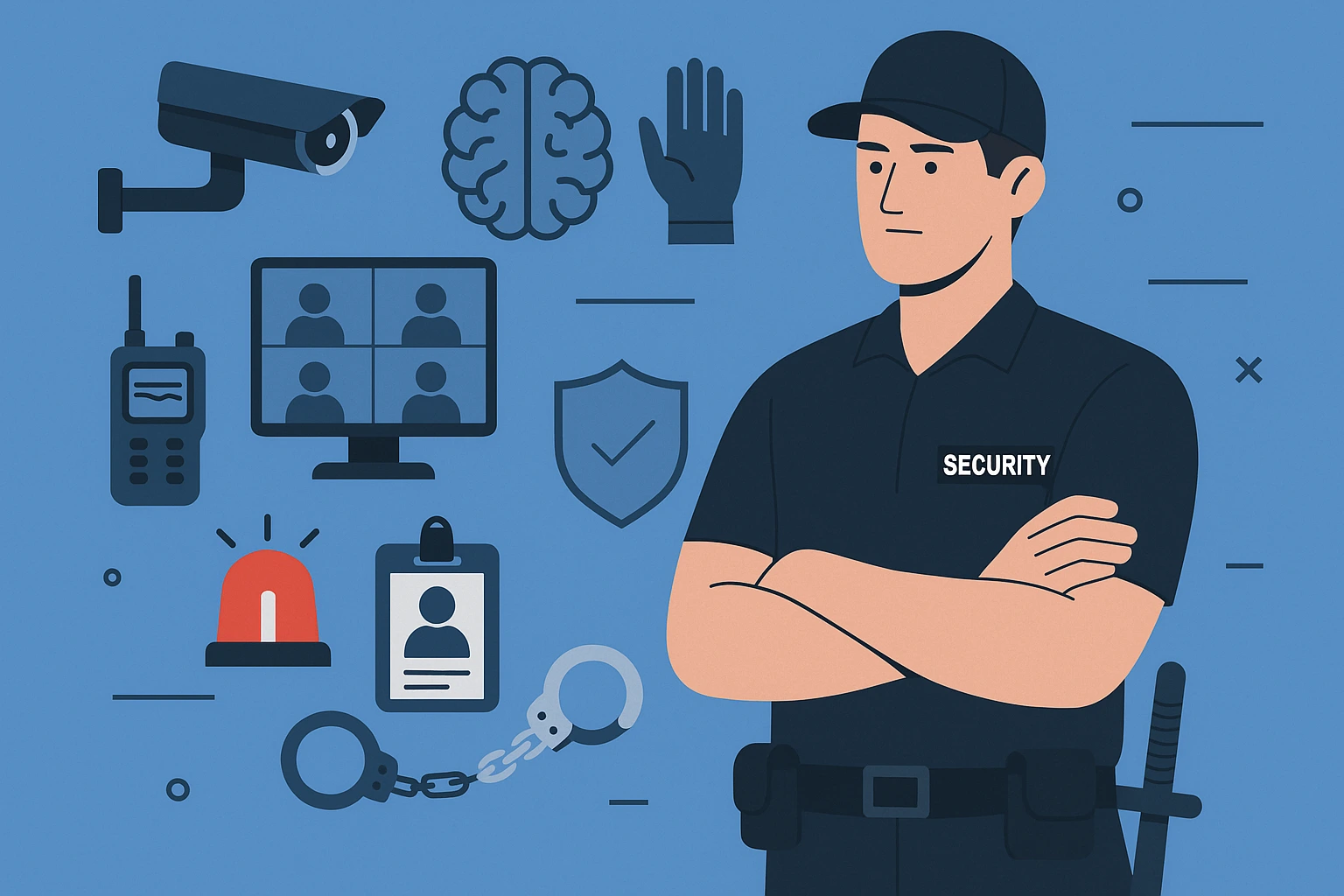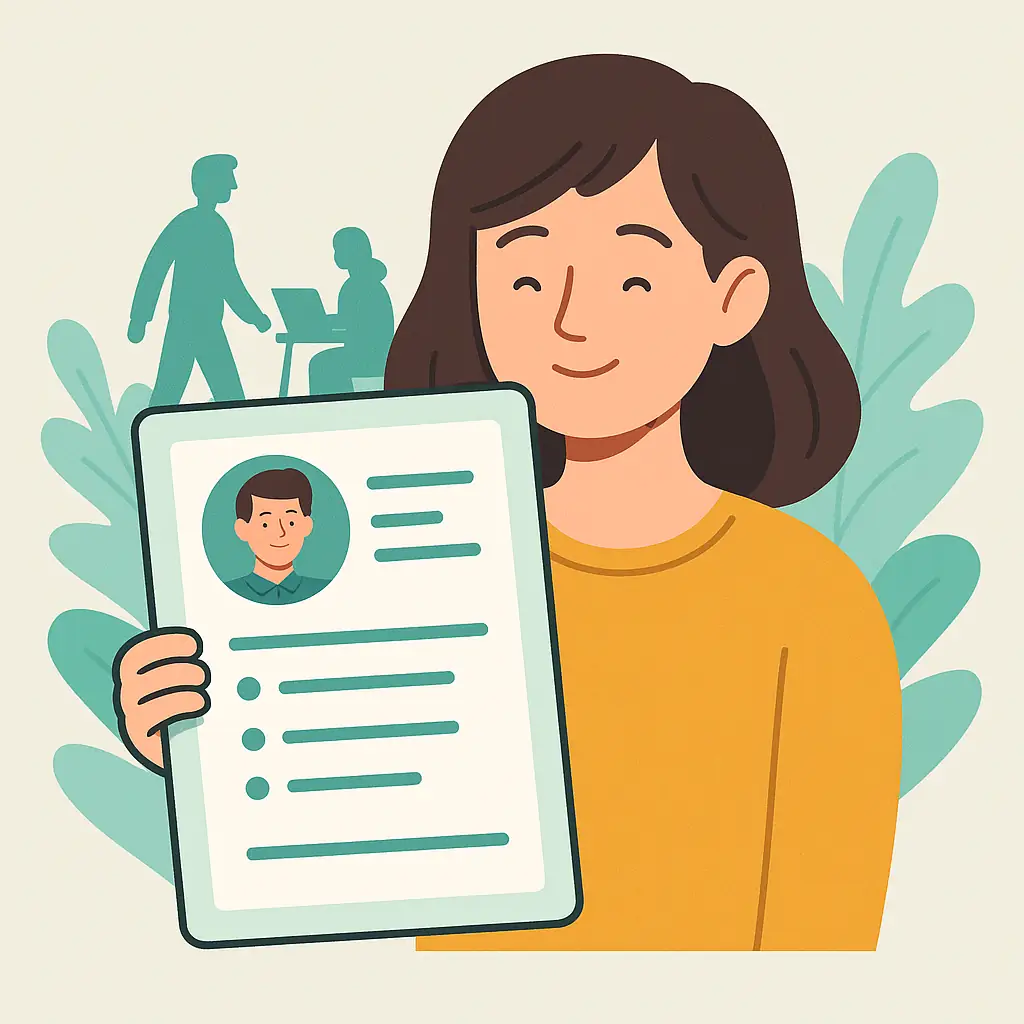Being a security guard is about far more than wearing a uniform or standing at an entry point. Security professionals serve as the first line of defense in keeping people, property, and even sensitive information safe. They are expected to observe, respond, and communicate effectively—often in environments that can shift from calm to high-pressure within seconds.
So, what separates a reliable guard from an exceptional one? The answer lies in skills. Beyond physical presence, great security guards blend sharp observation, conflict resolution, and communication abilities with technical knowledge, professionalism, and sound judgment. These skills not only boost day-to-day performance but also create opportunities for higher-paying positions and specialized roles in the security industry.
In this guide, you’ll discover:
- The most essential skills every security guard Resume needs (with real-world examples).
- Advanced and specialized skills to accelerate career growth.
- Practical ways to develop these skills through training and practice.
- Smart strategies to highlight security guard skills on a resume.
- Clear answers to the most common questions about security officer skills.
Core Skills For Security Guard Resume
While a security license is your ticket into the profession, it’s the following skills that will define your success and set you apart.
1. Observation & Situational Awareness
At the heart of a security guard’s role is the ability to see what others miss. Observation and situational awareness mean more than just watching; it’s about actively processing your environment. A skilled guard can notice a person loitering suspiciously, a vehicle that has passed by multiple times, or a misplaced item that could pose a risk. This proactive approach allows you to identify potential threats and take preventive action long before an incident occurs.
How to incorporate this skill: “Spotted an individual attempting to bypass a restricted area and intervened before a security breach occurred.”
2. Communication Skills
Effective communication is critical for managing people and sharing information. This skill set is twofold: verbal and written. Verbally, a guard must be able to give clear, concise instructions, offer calm reassurance during emergencies, and, most importantly, de-escalate a tense situation using a calm tone and strategic language. In writing, a guard needs to produce detailed and accurate incident reports. These documents are often used for legal proceedings or internal investigations, so clarity, objectivity, and precision are non-negotiable.
How to incorporate this skill: “Calmly de-escalated a verbal dispute between two visitors, preventing a physical altercation.”
3. Physical Fitness & Alertness
While not every security role is physically demanding, maintaining a good level of physical fitness and alertness is essential. Long shifts require stamina, and the ability to respond quickly and effectively to an emergency is non-negotiable. This could mean patrolling a large facility on foot, responding to an alarm across a vast campus, or having the physical readiness to assist in an emergency, such as a fire or medical incident.
How to incorporate this skill: “Maintained physical fitness to patrol a 50-acre facility, ensuring consistent and timely security rounds.”
4. Conflict Resolution & De-escalation
The ability to manage and resolve conflicts peacefully is paramount. A security guard’s job is to protect, and that often means preventing a verbal disagreement from becoming a physical confrontation. Conflict resolution skills involve active listening, empathy, and the use of strategic verbal techniques to calm an aggressive or intoxicated individual. A skilled security guard can often resolve a situation without ever having to resort to physical intervention, demonstrating professionalism and control.
How to incorporate this skill: “Successfully used verbal de-escalation techniques to handle an intoxicated person at a venue, ensuring a safe exit without incident.”
5. Technical & Surveillance Skills
Modern security relies heavily on technology. A proficient guard must be comfortable with and knowledgeable about a variety of systems. This includes operating and monitoring CCTV cameras, managing access control systems (like keycard or biometric scanners), and responding to alarm systems. The ability to navigate these technical tools efficiently ensures comprehensive coverage and a quick response to automated alerts.
How to incorporate this skill: “Monitored 30+ CCTV feeds simultaneously, leading to the identification and apprehension of a trespasser.”
6. Legal Knowledge & Ethics
A security guard operates within a legal framework. A basic understanding of the laws, rights, and limits of authority is crucial to performing the job ethically and effectively. This knowledge protects both the guard and their employer from legal issues. Knowing when you have the right to detain someone versus when you must simply observe and report to law enforcement is a critical distinction that demonstrates professionalism and sound judgment.
How to incorporate this skill: “Utilized knowledge of local laws to correctly identify when to detain a suspect versus when to call law enforcement.”
7. Teamwork & Collaboration
Security is often a collaborative effort. A security guard must be able to work seamlessly with coworkers, law enforcement, and other emergency services. Coordinating with police during an incident, sharing information with a manager, or working with a partner to patrol a large area are all scenarios where teamwork is vital for maintaining a strong and cohesive security presence.
How to incorporate this skill: “Coordinated effectively with local police during an investigation, providing critical information that led to a successful outcome.”
8. Customer Service & Professionalism
In many corporate, retail, or residential settings, a security guard is the first point of contact for clients, visitors, or residents. A professional and approachable demeanor is therefore a core skill. Customer service for a guard means being helpful and courteous while maintaining authority. This balance ensures that they are not only an effective deterrent but also a valued part of the community they serve.
How to incorporate this skill: “Provided excellent customer service to visitors at a corporate office while maintaining a professional and secure presence.”
9. Problem-Solving & Critical Thinking
Security is an ever-changing field, and guards often face unexpected situations that require quick thinking. Problem-solving and critical thinking are essential for assessing a situation rapidly, evaluating potential risks, and making a sound decision under pressure. This could involve figuring out how to handle a power outage, managing a lost child, or identifying the best way to respond to a suspicious package. The ability to think on your feet is what prevents minor issues from becoming major crises.
How to incorporate this skill: “Responded to a fire alarm by following emergency protocols and quickly locating the source, minimizing potential damage and ensuring a safe evacuation.”
10. Attention to Detail & Reporting
Every detail matters in security. An exceptional guard has a keen attention to detail, meticulously documenting everything from the time of a patrol to a minor irregularity in a security log. This skill is directly tied to accurate and thorough reporting. A well-written report that includes precise times, descriptions, and a clear sequence of events can be a crucial tool for management or law enforcement in post-incident analysis.
How to incorporate this skill: “Maintained detailed and accurate logs of all security activities, which were later used to assist in a theft investigation.”
11. Adaptability & Flexibility
The security environment is rarely static. A security guard needs to be adaptable and flexible to handle different tasks, shifting priorities, and a range of personalities. One moment you might be checking IDs at a front desk, and the next you’re responding to an alarm in a different building. Being able to adjust your approach and priorities on the fly is a key trait of a reliable security professional.
How to incorporate this skill: “Demonstrated adaptability by seamlessly transitioning from front-desk duties to patrol and alarm response as required by operational needs.”
12. Integrity & Trustworthiness
At the core of a security guard’s role is trust. They are responsible for protecting valuable assets, confidential information, and people. Therefore, integrity and trustworthiness are non-negotiable. A guard must always act honestly and ethically, even when no one is watching. This includes maintaining confidentiality, handling property with care, and adhering to all rules and procedures without exception.
How to incorporate this skill: “Exhibited unwavering integrity by consistently following company protocols, leading to a secure and reliable work environment.”
Ready to Land Your Next Job?
Don’t let your resume get lost in the stack. Build a professional, ATS-friendly resume that highlights your leadership, achievements, and industry expertise.
Advanced / Specialized Skills for Security Guards
While the core skills are essential for every security guard, developing advanced and specialized skills can significantly accelerate your career, leading to higher-paying jobs and leadership roles.
1. First Aid & CPR Certification
In any emergency, a security guard is often the first person on the scene. Having up-to-date First Aid and CPR certification is a crucial skill that can save lives. It shows you’re prepared to handle medical emergencies, from minor injuries to cardiac arrest, before professional medical help arrives.
Example 1: “Utilized CPR certification to administer life-saving aid to a visitor experiencing a medical emergency until paramedics arrived.”
Example 2: “Provided immediate first aid for a minor injury on-site, preventing a more serious condition and demonstrating readiness to respond to health crises.”
2. Crisis Management & Emergency Response
Beyond day-to-day patrols, security guards must be ready to manage major incidents. Crisis management and emergency response training prepares you to handle high-stakes situations like fires, natural disasters, or large-scale evacuations. This involves knowing how to stay calm under pressure, follow established protocols, and guide others to safety.
Example 1: “Successfully managed a building-wide evacuation during a fire alarm, ensuring all occupants followed emergency exit procedures safely and efficiently.”
Example 2: “Coordinated a swift and organized response to a power outage, securing critical areas and maintaining safety until power was restored.”
3. Cybersecurity Awareness
In today’s digital world, security threats aren’t just physical. For security officers working in corporate or tech environments, a basic understanding of cybersecurity awareness is becoming increasingly relevant. Knowing how to identify and report phishing attempts, unauthorized network access, or suspicious activities on company computers can be a critical part of your protective role.
Example 1 “Identified and reported a suspicious device attached to a company network, preventing a potential data breach.”
Example 2: “Provided guidance to new employees on basic cybersecurity best practices, reinforcing the importance of digital security.”
4. Leadership & Supervision
For those looking to move up, leadership and supervision skills are a must. This involves more than just giving orders; it’s about leading by example, mentoring junior guards, managing a team’s schedule, and overseeing a site’s security operations. Developing these skills shows you’re ready to take on greater responsibility and a more strategic role within an organization.
Example 1: “Mentored a team of three junior security guards, improving their on-site performance and ensuring adherence to company protocols.”
Example 2: “Developed and implemented a new patrol schedule that improved response times by 15%, showcasing strategic planning and leadership.”
5. Use of Force & Defensive Tactics
In rare situations where de-escalation is not successful, a security guard must know how to protect themselves and others. Use of force and defensive tactics training provides the knowledge and skills to handle physical confrontations legally and safely. This includes understanding when and how to apply force, mastering non-lethal self-defense techniques, and knowing how to control a subject without causing unnecessary injury.
Example: “Utilized certified defensive tactics to safely and effectively restrain an aggressive individual who was threatening staff, holding them for law enforcement without causing injury.”
6. Crowd Control & Management
For security guards working in venues, retail spaces, or events, crowd control and management is a crucial specialized skill. This involves more than just directing people; it’s about understanding crowd psychology, identifying signs of unrest, and using strategic positioning and communication to maintain order and prevent dangerous situations like stampedes or riots.
Example: “Directed and managed a large crowd during a high-profile event, successfully maintaining order and preventing conflicts from escalating by strategically monitoring and intervening.”
How to Develop Security Guard Skills
Becoming a better security guard isn’t about waiting for someone to teach you; it’s about deliberately practicing the right habits, getting the right training, and collecting evidence of your growth. Below are focused ways to develop the skills that actually matter on the job.
Learn on the Job — but learn with intent
Every shift is a lesson if you treat it that way. Before and after each shift, set one small learning goal: improve your camera scanning pattern, practice one de-escalation phrase, or test a new entry-control routine. Keep a tiny notebook or phone note with short reflections — what you saw, what you did, and what you’d try next time. Over weeks those short notes turn into a clear pattern of progress.
Example: After a night shift at a mall, note the three times you saw suspicious behavior and what you did differently the next night.
Take practical, recognized training
Do the obvious certifications early: First Aid / CPR and basic fire-safety training. Then add role-specific courses: CCTV operation, access-control systems, and your local/state security license. If you want to move up, look for leadership or incident-command courses. Short online modules are useful for theory — but always pair them with in-person practice.
Example: Complete a CPR course and then run a mock cardiac arrest drill with colleagues so you can actually practice compressions, timing, and hand-off to EMS.
Practice scenarios and role-play — repeatedly
Skills like de-escalation, crowd control, and emergency response only stick if you rehearse them. Organize 15–30 minute role-play sessions with team members: one person plays an irate customer, another practices calming language, a third times responses and notes wording that worked. Record (audio or notes) what diffused the situation and what escalated it. Repeat until the calm language becomes automatic.
Example: Simulate a drunken patron at a venue and practice the exact phrases and body language you’ll use to escort them out safely.
Build technical fluency with hands-on practice
Don’t only read manuals — use the tools daily. Spend a shift strictly focused on camera work: practice switching feeds, zooming, and logging timestamps. Learn basic troubleshooting (reboot a DVR, relay alarm codes correctly). The more comfortable you are with tech, the quicker you’ll spot real problems.
Example: Once a week, run a 30-minute “camera audit” where you walk each monitored camera area and verify its feed, angle, and blind spots.
Seek feedback and mentorship — ask for the hard truth
Find one experienced guard or supervisor and ask them to ride with you for a shift. Ask for two things: one thing you did well and one concrete thing to improve. Schedule follow-ups. Honest feedback accelerates growth more than solo practice.
Example: Ask your supervisor to observe a patrol and give one written note on your report writing and one on your patrol timing.
Keep a training log and build a micro-portfolio
Record every course, drill, and important incident you handled. Save copies (or sanitized versions) of incident reports, certificates, and supervisor feedback. This becomes your proof of competence when applying for promotions or new jobs. A one-page “security portfolio” is surprisingly powerful in interviews.
Example: Include a short entry: “June 12 — led fire-evacuation drill for 120 staff; timed exit: 3:45 minutes; improved signage added next week.
Learn soft skills deliberately — short daily habits
Soft skills improve with tiny daily exercises: practice 2 minutes of active listening during every visitor interaction; rehearse a polite but firm opening line to de-escalate tension; practice neutral body language in a mirror. Small, repeated habits compound into steadiness under pressure.
Example: Every morning, pick one phrase (“Help me understand what happened”) and use it until it feels natural.
Cross-train and volunteer for special tasks
Volunteer for tech checks, incident-report duties, crowd-control shifts, or safety committee spots. Exposure to varied tasks broadens your experience and reveals which skills you should prioritize. Employers notice guards who step up.
Example: Take the monthly slot to prepare the CCTV log — you’ll improve attention to detail and written reporting.
Use free and paid learning resources wisely
Short, practical courses (local community colleges, certified first-aid providers, or recognized industry bodies) are worth the time. Use online platforms for knowledge (how alarms work, basic cybersecurity awareness), but always apply that knowledge in drills or on-site practice. Avoid theory-only options unless you pair them with practical application.
Example: After an online module about access control, run a test of tailgating scenarios to apply what you learned.
Prepare for promotion — practice leadership now
If you aim to supervise, start practicing scheduling, briefing teams, and giving short after-action reviews. Leadership is learned in micro-steps: give clear instructions, follow up, and own outcomes. Track examples where your leadership prevented an issue.
Example: Lead a pre-event briefing for a small shift and collect feedback on whether your instructions were clear and complete.
Quick checklist you can use this week
- Book or renew a First Aid / CPR course.
- Do one role-play de-escalation session with a colleague.
- Keep a 3-line end-of-shift note for three consecutive shifts.
- Run a 30-minute camera audit during a quiet hour.
- Ask a supervisor for one piece of improvement feedback this week.
Developing security skills is deliberate work: small, repeatable actions + real training + honest feedback. Do those consistently, and you’ll see measurable improvement in performance — and better job opportunities — in months, not years.
How to Showcase Security Guard Skills on a Resume
Your resume is more than a list of duties — it’s your proof of reliability and competence. To stand out in the security field, show employers how you’ve applied your skills and back them up with recognized certifications.
Create a Clear “Skills” Section
Don’t bury your skills in your job descriptions. Create a separate, well-organized section on your resume where you can list your core competencies. This makes it incredibly easy for hiring managers to quickly scan your qualifications and see if you’re a good fit for the job.
Technical Skills: Alarm Systems, CCTV Software (e.g., Milestone, Genetec), Access Control Systems
Example:
- Advanced Skills: First Aid & CPR, Crisis Management, De-escalation, Risk Assessment
- Core Skills: Access Control, CCTV Monitoring, Incident Reporting, Patrolling
Tie Your Skills Directly to Your Experience
In your work experience section, use bullet points to link your skills to real-world results. This shows a potential employer not just that you have a skill, but how you used it to create value.
Example 1:
Security Officer – Corporate Facility, Dallas, TX
- Monitored 35+ CCTV feeds and patrolled 400,000 sq. ft. premises, preventing unauthorized access for 18 consecutive months.
- Responded to 15+ emergency situations, providing CPR and first aid with 100% compliance to American Heart Association guidelines.
- Enforced strict access control for a corporate facility with 500+ employees, verifying credentials and managing visitor logs to prevent unauthorized entry.
- Successfully de-escalated over a dozen confrontational situations using verbal techniques, preventing physical altercations and ensuring a safe environment for all patrons.
Example 2:
Security Guard – Shopping Mall, Toronto, ON
- Reduced shoplifting incidents by 25% in six months through proactive floor patrols and real-time communication with local police.
- Led fire evacuation drill for 200+ staff and customers, ensuring full clearance in under 4 minutes.
- Coordinated with local law enforcement to respond to security incidents, providing accurate and timely reports that aided in the successful resolution of two major cases.
- Led a fire evacuation drill for 200+ staff and customers, ensuring full clearance in under 4 minutes; later collaborated with management to update signage and improve crowd flow for future emergencies.
Use a Powerful Summary or Objective To Showcase Your Skills
Right at the top of your resume, include a brief paragraph that acts as your professional introduction. This is your chance to summarize your most valuable skills and experience. An objective statement is good for those new to the field, while a professional summary is better for experienced guards. In a resume objective is written when you have little to no experience.
Objective Example with skills (Entry-Level):
“Dedicated and reliable security professional seeking to apply strong observational and communication skills to a security guard position at [Company Name]. Eager to contribute to a safe and secure environment.”
Summary Example with skills(Experienced):
“Highly-trained security officer with 5+ years of experience in corporate and event security. Proven expertise in conflict de-escalation, advanced surveillance systems, and incident reporting, with a track record of improving site safety and security protocols.”
Turn Responsibilities Into Achievements
Employers don’t just want to know what you were “responsible for.” They want results. Instead of writing “Patrolled premises,” write:
“Patrolled 500,000 sq. ft. facility daily, preventing unauthorized entry for 12 months with zero incidents.”
Use Measurable Impact
Numbers prove credibility. Think: how many, how often, how much improved.
- “Reduced shoplifting by 30% through proactive floor patrols.”
- “Responded to 20+ medical emergencies with 100% compliance to First Aid protocol.”
Highlight Recognized Certifications
In both the U.S. and Canada, specific certifications instantly boost your credibility. Add them in a “Certifications” section or under training.
United States (examples by state):
- Guard Card (California) – required to work as a licensed security officer. Apply through the Bureau of Security and Investigative Services (BSIS).
- Unarmed/Armed Security License (varies by state: Texas, Florida, New York, etc.). Typically managed by the State Department of Public Safety or similar body.
- CPR/First Aid – through the American Red Cross or American Heart Association.
- Firearms Permit (for armed guards) – state-specific, often paired with additional background checks and training.
Canada (province-specific):
- Ontario Security Guard License – issued by the Ministry of the Solicitor General; requires a 40-hour training course and passing the provincial exam.
- Alberta Security Services and Investigators Act (SSIA) License – administered by the Alberta Justice and Solicitor General.
- British Columbia Security Worker License – managed by the Security Programs and Police Technology Division.
- Standard First Aid & CPR (Level C) – often mandatory, available via the Canadian Red Cross or St. John Ambulance.
Tailor Your Skill to the Job Description
A one-size-fits-all resume rarely works. Before you apply, read the job description carefully and look for keywords and specific requirements. If the job emphasizes technical skills like CCTV or access control, make sure those are front and center. If it’s a role in a retail environment, highlight your customer service and loss prevention skills.
Example: If a job posting mentions “crowd management for large events,” be sure to include a bullet point like, “Successfully managed crowds of over 5,000 attendees, ensuring orderly entry and exit while preventing conflicts.”
Use Action Verbs and Metrics To Demonstrate Your Skills
This is the single most important rule for a powerful resume. Instead of saying what you were “responsible for,” use strong action verbs to describe what you achieved. Wherever possible, back up your claims with metrics or specific details. This gives your accomplishments weight and makes them stand out.
- Weak: “Responsible for monitoring CCTV cameras.”
- Strong: “Monitored over 50 CCTV feeds, identifying and reporting suspicious activity that led to a 15% reduction in theft.”
Here are some strong action verbs to use:
- Managed
- Secured
- Protected
- Implemented
- Conducted
- Monitored
- Resolved
- Trained
- Coordinated
By blending achievements with recognized certifications, you don’t just tell employers you have the right skills — you prove it with evidence they trust.
Formatting Tips For Skills Section Of A Security Guard Resume:
- Use a clear heading — label it as “Skills” or “Core Skills” so recruiters and ATS can find it easily.
- Stick to bullet points or a clean 2-column list instead of long sentences. This keeps it scannable.
- Mix hard and soft skills — for example, list CCTV Monitoring, Access Control, First Aid/CPR alongside Conflict Resolution, Communication, Professionalism. Add computer skills also to show your tech proficiency.
- Prioritize relevance — place certifications or specialized skills (like Fire Safety or Armed Security) higher if the job ad emphasizes them.
- Keep it concise — 8–10 skills are usually enough; too many looks cluttered.
Ready to Land Your Next Job?
Don’t let your resume get lost in the stack. Build a professional, ATS-friendly resume that highlights your leadership, achievements, and industry expertise.
Resume Example For Security Guard | Text Sample
James Carter
123 Main Street | Dallas, TX 75201
📞 (214) 555-2345 | ✉️ james.carter@email.com
LinkedIn: linkedin.com/in/jamescarter
Resume Summary
Reliable and alert Security Guard with 5+ years of experience protecting corporate facilities, retail environments, and public events. Skilled in surveillance, conflict resolution, and emergency response. Known for balancing firm authority with approachable professionalism. Licensed and CPR-certified, with a proven track record of reducing incidents and improving workplace safety.
Skills
- CCTV & Access Control Monitoring
- Conflict Resolution & De-escalation
- Incident Reporting & Documentation
- First Aid & CPR (American Red Cross Certified)
- Customer Service & Professionalism
- Fire Safety & Emergency Evacuation
- Team Collaboration with Law Enforcement
(Canada variation: Replace CPR line with “Ontario Security Guard License, Standard First Aid & CPR – St. John Ambulance Certified”)
Professional Experience
Security Officer – ABC Corporate Facility, Dallas, TX
2019 – Present
- Monitored 35+ CCTV feeds and patrolled a 400,000 sq. ft. office complex, preventing unauthorized access for 24 consecutive months.
- Responded to 15+ emergency incidents including medical crises and fire alarms, providing CPR and first aid with 100% protocol compliance.
- Trained and supervised a team of 4 junior guards, ensuring smooth shift transitions and accurate handover reports.
Security Guard – XYZ Shopping Mall, Dallas, TX
2016 – 2019
- Reduced shoplifting incidents by 30% in one year through proactive patrols, incident reporting, and coordination with local police.
- Led monthly fire evacuation drills for 200+ staff and visitors, achieving safe clearance under 5 minutes.
- Assisted mall visitors daily, balancing customer service with strict enforcement of security protocols.
Certifications
- State Security License (Texas Department of Public Safety)
- CPR & First Aid – American Red Cross (Valid through 2026)
- Fire Safety & Emergency Procedures Training
(Canada variation: Ontario Security Guard License – Ministry of the Solicitor General | Standard First Aid & CPR – Canadian Red Cross)
Education
High School Diploma
Roosevelt High School, Dallas, TX — 2015
Why This Resume Example Is Good:
- Mixes hard skills (CCTV, First Aid) with soft skills (customer service, de-escalation) for balance.
- Uses numbers and achievements instead of vague duties, making impact clear.
- Certifications like CPR and licenses are highlighted for credibility.
- Professional, easy-to-read format with action verbs that feels human and confident.
Conclusion
A great security guard is more than a uniformed presence—they are a professional who combines technical know-how with strong people skills. Observation, communication, and conflict resolution form the foundation, while advanced abilities like first aid, crisis management, and leadership help guards stand out in the field.
Balancing hard skills (like surveillance and legal knowledge) with soft skills (like customer service and professionalism) is what makes a guard truly effective. And since security challenges are always evolving, continuous training and skill development are key to long-term career growth.
Whether you’re just starting out or aiming for senior positions, investing in these skills will not only make you better at the job but also open doors to higher-paying and specialized roles in the security industry.
FAQs(People Also Asked)
While many skills are important, the top five essential skills for a security guard are: Observation and Situational Awareness, Communication, Conflict Resolution and De-escalation, Problem-Solving, and Legal Knowledge. These skills are the foundation of effective security work.
Improving observation skills requires active practice. You can start by setting a goal for each shift, such as mentally noting every person who enters or exits an area. Practice scanning your environment methodically and look for things that seem out of place. Keeping a log of what you observe can also help you identify patterns and improve your attention to detail over time.
Yes, communication skills are one of the most critical abilities for a security guard. A guard must be able to give clear verbal instructions, write detailed incident reports, and use de-escalation techniques to handle difficult situations without physical force. Without strong communication, a guard cannot effectively perform their duties or work with law enforcement.
Beyond the standard security license, several certifications can significantly boost your skills. These include First Aid & CPR Certification, specialized training in Crisis Management, and courses on De-escalation and Conflict Intervention. These certifications prove your readiness to handle a variety of emergencies and complex interpersonal situations.
To list your skills on a resume, you should create a dedicated Skills section at the top. Within your experience section, use action verbs and metrics to demonstrate how you applied those skills on the job. For example, instead of saying you were “responsible for cameras,” say, “Monitored 30+ CCTV feeds to prevent security breaches.”









